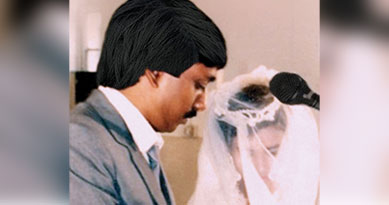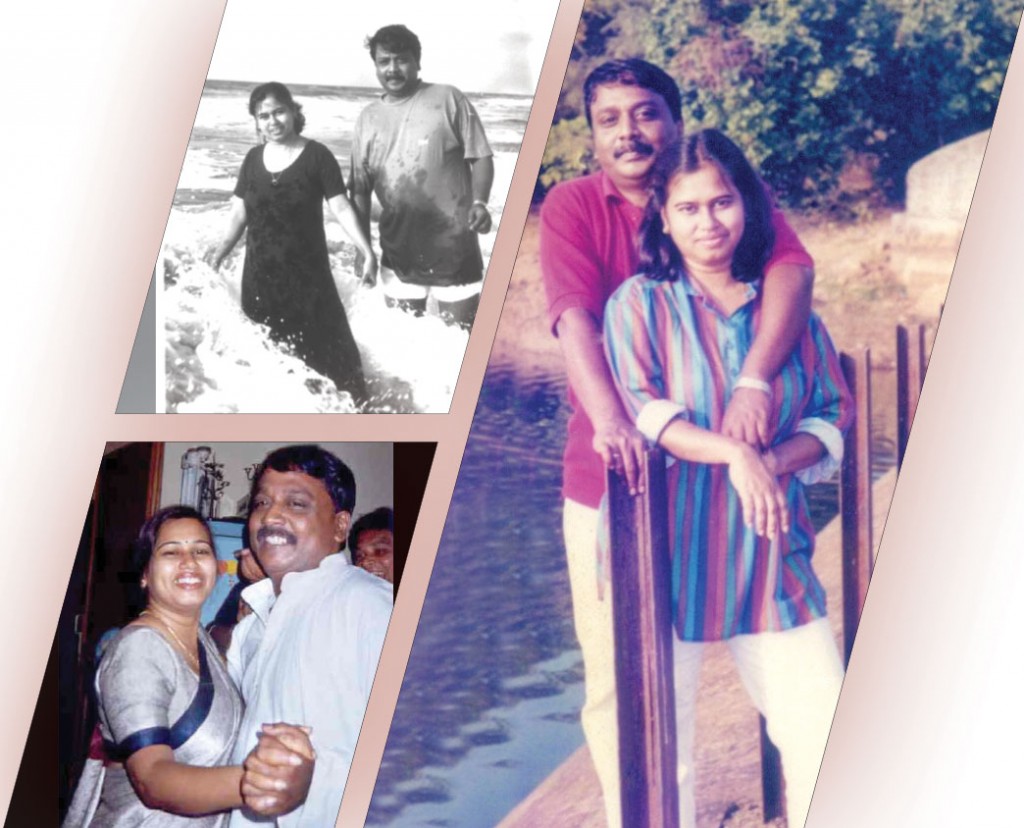
The cheerful laughter of the girls in the orphanage has made it easier for Reena Ravichandran to leave behind memories of the silent and suffocating stillness of the hospital corridors where she had waited and watched her husband fight life-threatening injuries after a tragic accident. “In the hushed halls of the hospital, I spent sleepless nights, consumed by worry and fear of what lay ahead. But at the orphanage, in the company of these abandoned children, the emotional turmoil that once threatened to engulf my life is replaced by a sense of purpose and healing,” she says.
In 1984, in Calcutta, Reena, a young Bengali, met the love of her life, Gilbert Ravichandran, a Tamil Christian from Chennai. They married in 1988, despite initial resistance from Ravichandran’s family. Within a month, she won their hearts, and with the birth of their son in 1990, their bond grew stronger.
In 2003, Ravichandran met with a life-altering motor bike accident in Bhubaneswar. Although he received treatment for his physical injuries, unnoticed blood clots formed in his brain. A year later, Reena found him paralysed in bed; she swiftly rushed him to the hospital where the medical team successfully removed one of the three clots.
After three months of recovery, he returned to work and was transferred to Chennai. Ravichandran suffered a severe convulsion while at work, and his colleagues rushed him to the nearest hospital. Reena boarded a flight to Chennai, pleading with doctors there for his admission, accepting full responsibility for the outcome as he had a mere five per cent chance of survival. By the time she landed in Chennai, he had slipped into coma. Despite advice from friends and family to pick up the threads of her life, she remained by his side, helping him recover.

Two months later, they were returning home on a train when just one station away from Bhubaneswar, he was struck by another convulsion. Reena, trembling with fear, acted swiftly, placing a spoon between his teeth to prevent him from biting his tongue. She was supposed to administer a critical injection, but her trembling hands refused to cooperate. “I fell on my knees, holding my husband, and began to pray. Miraculously, the convulsion subsided, but there was no time to process the emotional whirlwind. I wiped my tears, removed the spoon from his mouth, and comforted him. He had no memory of the convulsion when he returned to his senses.”
A series of surgeries and hospitalisation ensued soon after. On their 25th anniversary in 2013, Ravichandran couldn’t recognise her when she wished him a Happy Anniversary. “He thought I was joking and I was worried that he would be furious with my behaviour. He had lost his memory,” she says. In her role as the primary caregiver, she witnessed firsthand the suffering and immense pain her husband endured, “which took a heavy emotional toll on me and tore me apart.” Despite the heartbreak, she decided to stay dedicated to his recovery and visited him every single day “as a friend,” she says with a crack in her voice.
It was as though we were back in 1984, an echo of our early romance when we exchanged love letters.
– Reena Ravichandran
Reena engaged him in heartfelt conversations, sharing stories of their past, their favourite food, their workplace… He recognised her place of work and said that ‘his wife’ worked there too and asked Reena if she could give his wife a letter. She agreed.
“It was as though we were back in 1984, an echo of our early romance when we exchanged love letters,” she says. Although life had become a tightrope walk between taking care of their son, office hours, and hospital visits at night, she had these letters to look forward to. “In between the constant worry, anxiety and fear for the well-being of my family, these letters were a reminder that he remembered me and loved me and that there was hope,” she says.

In total, they exchanged an astonishing 400 letters, each containing intimate notes and the everyday details of their lives. In some of these letters, he shared heartfelt requests, such as ensuring that funds raised for the underprivileged by his company reached their destination without a hitch. In others, he simply asked for pens and a notebook to continue writing to her.
In February 2014, a ray of hope emerged when he recognised Reena and spoke to her and said that he was sorry to have put her through so much. But the very next month, Ravichandran passed away in the hospital. When Reena returned home after completing the hospital formalities she realised with a broken heart that, “I didn’t have to administer any injection or give him any pills. I didn’t have to check on him. I had nothing to do! That was the first time I broke down when I came to terms with the fact that he would never come home,” she says in a heavy voice.

Months of grief followed as Reena grappled with depression, “mourning the loss of the person I loved and the life we once had together.” She walked nearly 15km back home from work, hoping exhaustion would help her sleep. Her eating habits had changed and she felt “sad and helpless, and at times, was frustrated and angry and wanted to remain alone,” she adds. Witnessing her anguish, her 18-year-old son expressed his fear of becoming an orphan. It was a wake-up call for Reena, “a powerful motivator to combat my depression.”
With the support of friends who were doctors, Reena began her journey of healing. Books on positivity became her companions, and spending time at the orphanage in Bhubaneswar brought her a newfound perspective. She transformed her painful memories into happier ones, remembering the love and joy she and Ravichandran had shared. “There is no shame in asking for help. Life is a beautiful journey with its ups and downs. I can never forget my husband, and to honour his life and the love he brought to me, I will lead a healthy, happy life until we reunite on the other side,” she says.
Through her membership with RC Bhubaneswar Friends, RID 3262, she continues her journey of healing, dedicating herself to social service. One club project that is particularly close to her heart is Aso Gopiba, which translates from Odia to Come, let’s chat. Tables and chairs are set up in selected parks in the city on Sunday mornings. Reena and other members invite people to chat, reach out to senior citizens, create awareness about mental health, and discuss the work of Rotary.





